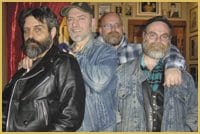A year after it went into hibernation, the BC Bears Society voted to return the society to its founder at its annual general meeting (AGM) Mar 16.
The 13 members who attended the AGM voted unanimously to hand control of the not-for-profit society and its administrative obligations to founder Andrew Peck. The membership also agreed to separate the society from the casual social group that has continued to meet informally for coffee nights since the BC Bears went into hibernation after its last AGM on Mar 25, 2007.
Only 10 members attended last year’s AGM, amid concerns of dwindling membership and interest in the society.
“Through the next year we will see what happens, and will call an AGM next March 2008 for discussion, if any,” BC Bears secretary Maxwell J Bylander wrote last year in a letter to the community. “If not, we will stay in hibernation until a group makes a commitment and is dedicated to bringing the BC Bears out of hibernation.”
Peck says he has no immediate plans to bring the society out of hibernation to begin fundraising or holding large events such as the Bears’ signature Furrball again. He says he simply wants to ensure that the society does not disappear after the original effort and expense required to establish it.
“I will make sure it’s maintained,” he explains. “What’ll happen in the next 12 months remains to be seen. I have some ideas of where I’d like to see things [go], but I’m just going to see what happens.”
He says he’s not surprised by the AGM’s outcome.
“It was fairly obvious what was going to happen. There was not a will to continue to operate the organization,” he says.
“I attended this meeting with the purpose of making sure that the society would continue to operate as a society, and do what it’s supposed to do,” he adds.
The current BC Bears Society president is pleased with the meeting’s outcome. This decision meets the group’s needs, says Gerry McCadden.
“We had a scenario of: repair a tarnished reputation, keep a club going, change a club, [or] close a club, and come out with a positive that would satisfy everybody all at the same time. It wasn’t just one issue,” he says.
Peck proudly recalls the Bears’ beginnings as a society in 1994.
“This organization got together because we do good work,” he says. “I always said that the Bears were like the gay Rotary. They were the folks that gathered people together under a joint cause and did good work for the community; not necessarily the gay community but the community at large.
“Think about the tens of thousands of dollars that was raised for [BC] Children’s Hospital. It was the right thing to do, and it continues to be the right thing to do.”
Society member and former Mr BC Bear Grizzly Bill Houghton is also satisfied with the meeting’s outcome. “These guys have done very well,” he says. “To have 14 years for any club in this city is pretty good. Most clubs don’t make it past 10.”
Houghton supports the informal coffee nights as a way to maintain connection within the Bear community.
“I think that’s great. It’s a small start,” he says. “If that’s the way it’s going to go for a long time afterwards, so be it. If other things come out of that, great.”
He is also optimistic about a new monthly bear-focused evening at the Davie Village Café called Grip. “I hope it works,” he says. “I hope they get a good crowd and keep on doing it. A lot of the times things have been started and there hasn’t been a great response, so people shut down immediately.”
As for maintaining the formal Bears Society, Houghton is hopeful but doesn’t want to actively participate.
“Several of us have been with the club for years and we’re burned out,” he says. “The support of the club, with membership, it’s gone down and down and down.
“I was willing to accept the fact that if the club was to go on, in whatever form, I would support it as a member,” he continues, “but I didn’t want to be in a responsible organizational capacity. I don’t mind doing things, but I’ve done that route with this club and [others].”
McCadden says taking a year to hibernate before deciding the society’s fate was a good decision.
“[It] gave the bear community a time out of obligation. A time to think: ‘What do I want? What type of group? What do I need in the community? Do I need anything, or can we just all be a big group of friends?’ That’s what [it] really was intended for. It was a good idea. The results today show it.”

 Why you can trust Xtra
Why you can trust Xtra


